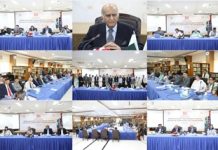With the grave state of affairs in Pakistan, there is a pressing need to revert to the Quaid’s ideals to pull the country out of the hopelessness that pervades every layer of society
One of the many tragedies of Pakistan is that narrow and self-centred political interests have pushed to the periphery the ideals put forth by the country’s founder. Individual leaders, ambitious but essentially insecure military rulers and the entire political class that dominates dynastic politics and political parties could not really own and live up to the ideals of the Quaid. The reason is simple, and obvious to anyone familiar with how they have conducted themselves in and out of power.
The political beliefs and practices of our rulers, with very few exceptions, have clashed with everything the Quaid stood for. It is unnecessary to say anything about our self-appointed military messiahs and the great deliverers from the political class. What they have done to the country, to the institutions, political norms and the vision of our founding fathers, is unbecoming in the extreme. Worse, they claim that they have acted and continue to act to realise the political dream of the Quaid. It is depressing to watch a ruler at the pulpit making claims without any remorse about the damage he might have done to the political legacy of the founder.
It is rare in the history of nations when the ideals of the founders, particularly when those ideals are so relevant to our times, are sacrificed for the narrow interests of a few individuals and their cronies. It has happened in Pakistan repeatedly. Each time, the party of the founder was used to pursue political interests and objectives quite opposite to those of the Quaid. Officially patronised factions from the time of Ayub Khan to the Musharraf years have, using different prefixes, endorsed and supported martial law regimes, military dictators and the abrogation and mutilation of the Constitution.
Having lived under long periods of political manipulation, tyranny and oppression in Pakistan, we have forgotten the vision and the ideology of the Quaid and the kind of political order he had visualised for the country. It is up to us to present the real Quaid and determine who his true heirs are.
First, let us briefly look at what the Quaid stood for and what he did not. Quaid-e Azam Mohammad Ali Jinnah was one of the truly great leaders of the subcontinent, perhaps one of very few in the colonial Muslim world who belonged to the reformist, Muslim modernist stream. Intellectually and philosophically, he was embedded in the tradition of Sir Syed Ahmad Khan and Allama Iqbal, two other rationalist Muslim thinkers and leaders who believed that Muslims could progress and empower themselves, and find respect in the world through enlightenment, recovering Islam from tradition and by accepting modern institutions and practices through rational and creative interpretation.
The Quaid’s political struggle, though influenced by modernist Muslim thought, was actually more focused on the question of independence of India, representation of all religious and other minorities in political power and on constitutional and legal issues concerning the future of Muslims in the subcontinent. But that is a much broader political picture of Jinnah’s politics that was deeply rooted in liberal, secular and modernist thought.
Jinnah was truly impressed by the liberal constitutional tradition of the West and norms like rule of law, justice and fairness. It is not surprising that he emerged as one of the most eminent leaders who believed that the British political institutions that the Empire had introduced could be the basis on which the future state of Pakistan would rest. This was a vision that other Indian leaders shared and worked for using local cultural idiom.
The Quaid had no system in mind except constitutionalism, popular sovereignty and a parliamentary form of government founded in the principles of liberty and equality. Those who were selfish and driven more by their own narrow interests began to declare after the death of the Quaid and the assassination of Liaquat Ali Khan that Pakistan was not really fit for democracy, in other words the ideology of Quaid was irrelevant, suited other countries and was meant for other times.
After more than sixty years, we hear the same clichéd and stale comments: Pakistan is a different society than others where constitutionalism and democracy function and it will have to be ruled the way it has been, i.e., without any regard for the independence of the judiciary, the rule of law and the constitution.
With the grave state of affairs in Pakistan, there is a pressing need to revert to the Quaid’s ideals to pull the country out of the hopelessness that pervades every layer of society. During the dark Musharraf years, there have been brave women and men in different professions who have been resisting his rule. More so since the president’s decision to sack the Chief Justice of Pakistan, and even more so since his re-conquest of the state through a dismissal of the judiciary and suspension of the constitution.
Our national heroes today are the media persons, lawyers, judges who refused to accept the mutilated constitution, civil society activists and the young students who have used every peaceful means to register protest against their country being robbed of honour, dignity and civility. Contrary to the power politics and interests of the political class, all sectors of Pakistan’s new social movement have gone back to the ideals of the Quaid supremacy of the constitution, independence of the judiciary, the rule of law and the sovereignty of parliament.
In this movement, we have a glimmer of hope and we can start dreaming about the ideals that the Quaid and other modernist Muslims held so high in the ranking of all social and political values. It is for the first time in our history that we have a movement shaped by democratic and constitutionalist ideas, and not by any political interest to bring in particular leader or party in power. That is all secondary to setting the institutional order back on the rails.
Deceived and defrauded by fake leaders for too long, we have found the true heirs of the Quaid in the new social movement. The ideals they are pursuing may link us with our earlier movement against Ayub Khan in late 1960s, and help us restore the faith and confidence of ordinary people in the institutions that the present ruler and his predecessors have so wantonly destroyed to advance their interests.
The author is a professor of Political Science at the Lahore University of Management Sciences.












